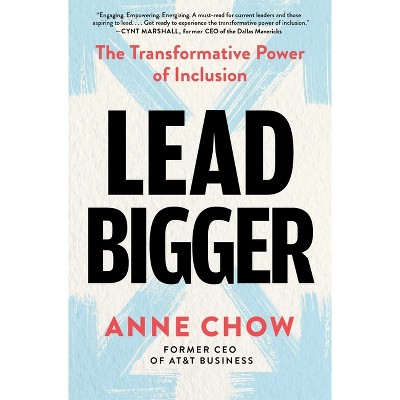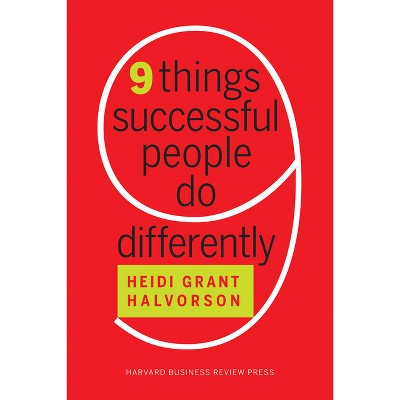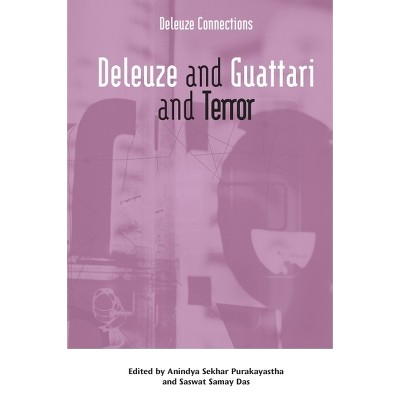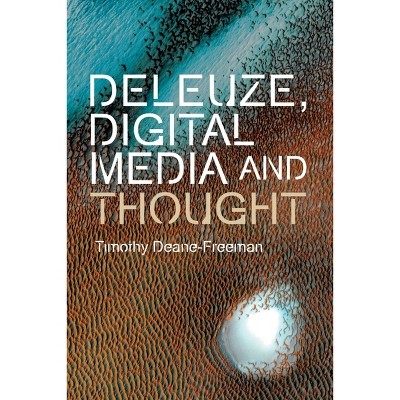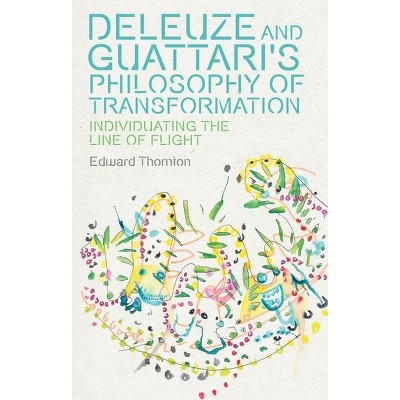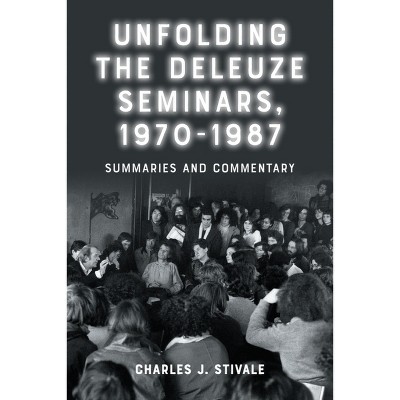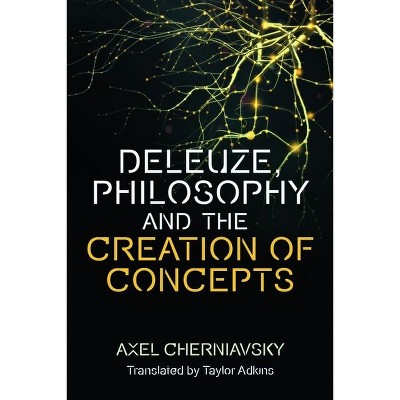Sponsored

Deleuze's Foucault - by Christopher Penfield (Hardcover)
$125.99
Pre-order
Eligible for registries and wish lists
Sponsored
About this item
Highlights
- Christopher Penfield illuminates the philosophical encounter between Gilles Deleuze and Michel Foucault, developing the first systematic treatment of Deleuze's book Foucault, originally published in 1986.
- Author(s): Christopher Penfield
- 288 Pages
- Philosophy, Individual Philosophers
Description
About the Book
How does Deleuze's study of Foucault challenge and deepen our understanding of both philosophers' thought?Book Synopsis
Christopher Penfield illuminates the philosophical encounter between Gilles Deleuze and Michel Foucault, developing the first systematic treatment of Deleuze's book Foucault, originally published in 1986. Using the full spectrum of Foucault's primary texts, as well as new insights and analysis from Deleuze's recently translated and published seminars on Foucault, Penfield identifies and elaborates the two thinkers' shared philosophy of force as the novel conceptual framework of 'virtual force ontology.'
For the field of Foucault studies, where Foucault still meets with misunderstanding, Penfield clarifies and motivates the demanding, highly abstract portrait of Foucault that Deleuze offers; and in demonstrating Deleuze's philosophical reconstruction, unlocks unrealized aspects of Foucault's thought. For students as well as scholars of Deleuze, Penfield establishes the unique place and importance of Foucault in Deleuze's oeuvre, illuminating the fundamental impact of Foucault on Deleuze and the 'common cause' (Deleuze) that shaped the course of their mutually transformative philosophical relationship.Review Quotes
In a 1970 review of two recent books by GIlles Deleuze, his friend Michel Foucault ventured that 'perhaps one day, this century will be known as Deleuzian.' If there has been any ascendant influence of French philosophy over the past half-century of the critical social sciences and humanities, it has seemingly been that of Foucault's genealogy. Christopher Penfield's book shows that Foucault was, however, nevertheless quite right. If the last half-century has been more Foucauldian, it is only in terms of what are the fundamentally Deleuzeian stakes of Foucault's philosophy. Through a meticulous study of Deleuze's 1986 book on Foucault, Penfield brings into view the transversal reciprocal effect of Deleuze and Foucault and Foucault through Deleuze. It is only through Deleuze that we can understand what Penfield calls "the primacy of practice" in Foucauldian genealogy and the "virtual force ontology" at the heart of the Foucauldian analytics of power.--Colin Koopman, University of Oregon
This is a careful nuanced analysis of one of the most productive intellectual friendships in the history of Western philosophy, between Foucault and his exploration of the relations between power and knowledge and Deleuze and his understanding of the transversal and marginal lines of flight that cross these relations. Christopher Penfield shows the creative force and future potential of these conceptual encounters and the profound and utterly original questions they raise that may enable new ways of thinking and living to be created.--Elizabeth Grosz, Duke University
Dimensions (Overall): 9.21 Inches (H) x 6.14 Inches (W)
Suggested Age: 22 Years and Up
Number of Pages: 288
Genre: Philosophy
Sub-Genre: Individual Philosophers
Publisher: Edinburgh University Press
Format: Hardcover
Author: Christopher Penfield
Language: English
Street Date: April 30, 2026
TCIN: 1005632192
UPC: 9781399530095
Item Number (DPCI): 247-45-6470
Origin: Made in the USA or Imported
If the item details aren’t accurate or complete, we want to know about it.
Shipping details
Estimated ship dimensions: 1 inches length x 6.14 inches width x 9.21 inches height
Estimated ship weight: 1 pounds
We regret that this item cannot be shipped to PO Boxes.
This item cannot be shipped to the following locations: American Samoa (see also separate entry under AS), Guam (see also separate entry under GU), Northern Mariana Islands, Puerto Rico (see also separate entry under PR), United States Minor Outlying Islands, Virgin Islands, U.S., APO/FPO
Return details
This item can be returned to any Target store or Target.com.
This item must be returned within 90 days of the date it was purchased in store, shipped, delivered by a Shipt shopper, or made ready for pickup.
See the return policy for complete information.
Frequently bought together

$8.99
Buy 1, get 1 50% off select books
5 out of 5 stars with 1 ratings
Trending Book Pre-Orders

$19.99 - $20.58
MSRP $19.99 - $30.00
Buy 1, get 1 50% off select books
5 out of 5 stars with 6 ratings

$10.19 - $23.09
MSRP $15.99 - $32.99
Buy 1, get 1 50% off select books
4.6 out of 5 stars with 78 ratings

Highly rated
$17.83 - $18.59
MSRP $19.99 - $30.00
Buy 1, get 1 50% off select books
4.4 out of 5 stars with 8 ratings

$16.65 - $22.99
MSRP $22.99 - $29.99
Buy 1, get 1 50% off select books
4.2 out of 5 stars with 14 ratings

Highly rated
$15.19 - $16.78
MSRP $18.99 - $27.99
Buy 1, get 1 50% off select books
4.9 out of 5 stars with 8 ratings

Highly rated
$20.09 - $20.99
MSRP $20.00 - $29.99
Buy 1, get 1 50% off select books
4.8 out of 5 stars with 17 ratings
